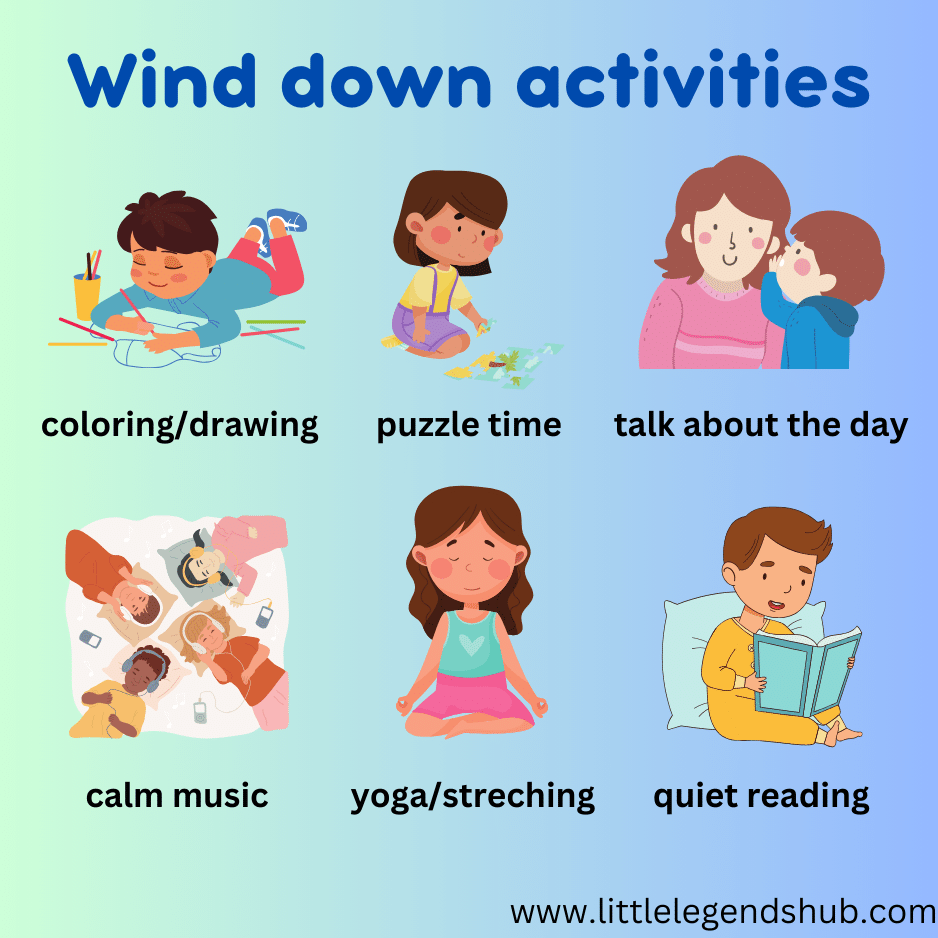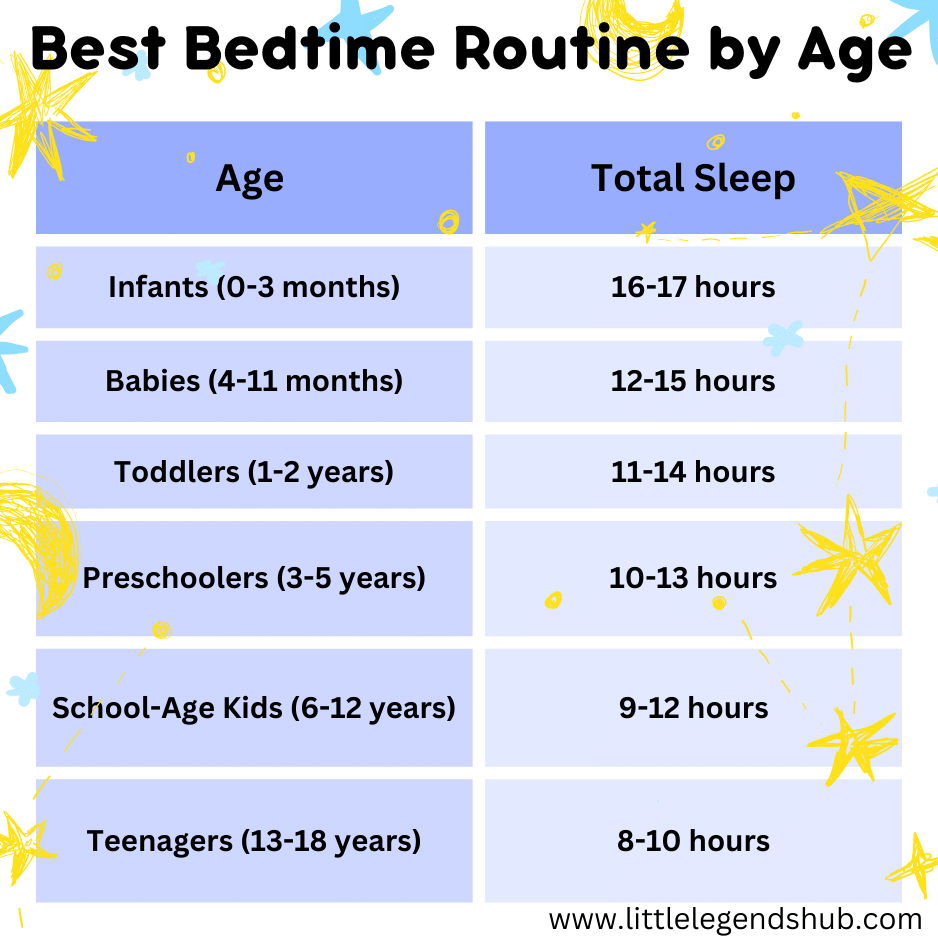In the hustle and bustle of our daily lives, it’s easy to underestimate the importance of a peaceful bedtime routine for kids. Many parents may overlook this essential aspect of child rearing, but the truth is, a well-structured bedtime routine can work wonders for your child’s physical and emotional well-being.
To start a bedtime routine for your children may seem like a simple task. However, it’s more than just a set of rules; it’s a powerful tool that can benefit both parents and children alike.
In this article, we’ll explore why establishing a bedtime routine is essential for kids’ well-being and how it can contribute to peaceful nights for the entire family.
The Importance of Sleep Routine for Children
Children thrive on routine. Establishing a bedtime routine not only helps children feel safe and secure but also provides a structured environment that fosters healthy development.
Structure and Security

A bedtime routine is incredibly important for toddlers, as it provides them with the structure and predictability they need for a sense of security and comfort. Toddlers can often feel overwhelmed by the world around them, and a consistent bedtime routine can be their anchor, helping them feel safe and cared for.
Healthy Sleep Patterns
One of the primary benefits of a bedtime routine is its role in promoting healthy sleep patterns. It helps regulate a child’s internal clock, making it easier for them to fall asleep and wake up at the same times each day. This consistency is crucial for their physical and mental development.
Emotional Stability
Children, especially toddlers, thrive on predictability. A well-structured bedtime routine can enhance emotional stability by reducing anxiety. When children know what to expect, they are better equipped to manage stress and emotions effectively.
Better Sleep Patterns
One of the most significant benefits of a bedtime routine is improved sleep quality. Children who follow a consistent bedtime routine tend to fall asleep faster and enjoy more uninterrupted sleep throughout the night. This, in turn, leads to increased alertness and better overall health.
Reduced Anxiety
A predictable bedtime routine can help reduce anxiety in children. Knowing what to expect at bedtime provides comfort and eases any worries they may have about the dark or being alone.
Creating a Bedtime Routine
Now that we’ve highlighted the importance of a bedtime routine let’s discuss how to create one that works for your family.
- Set a Consistent Bedtime: Pick a regular time to go to bed.This helps kids know when it’s time to sleep. Choose a specific time for your child to go to bed each night, and stick to it. Consistency is key in establishing a routine that your child can rely on.

- Bath or Shower: A warm bath can help kids feel clean and relaxed. It’s a good start to the routine.
- Pajamas On: Help your child change into comfy pajamas. It’s a signal that bedtime is coming.
- Brush Teeth: Get those little teeth clean and shiny. No more snacks after this!
- Story Time: Read a bedtime story. It’s a special time for bonding and winding down.
- Hugs and Kisses: Give goodnight hugs and kisses. Tell them you love them.
- Lullaby or Soft Music: Play gentle music to calm them down. It’s like a lullaby.
- Lights Dimmed: Make the room darker. It’s like sending a message to their brain that says, “Hey, it’s time to sleep now!”
- Comfort Items: If your child has a special stuffed animal or blanket, make sure they have it with them.
- Stay Calm: Be patient and soothing. Kids may need some time to settle down.
Consistency is key! Stick to the same routine every night, and your child will learn when it’s time to sleep. It makes bedtime easier for both you and your child.
Wind-Down Activities
Wind-down activities are things you can do with your kids to help them relax and get ready for bedtime. Here are some simple activities you can try with your child.
Coloring or Drawing: Sit down with your child and color or draw together. It’s a calm and creative activity.

Quiet Reading: Read a quiet book together. It’s a nice way to unwind.
Puzzle Time: Work on a simple puzzle or play a quiet board game. It helps focus their mind.
Soft Music: Listen to gentle music or lullabies. It can make them feel cozy and calm.
Talk About the Day: Have a little chat about the day. Share your favorite moments.
Yoga or Stretching: Do some simple stretches or yoga poses. It’s good for their body and mind.
Gentle Massage: Give a gentle back or foot massage. It’s soothing and comforting.
Remember, the key is to keep these activities quiet and calming to help your child wind down and get ready for a good night’s sleep.These activities signal to your child that it’s time to relax.
Good bedtime routine for toddlers
• A warm bath to relax their muscles.
• Brushing teeth to establish good dental hygiene habits.
• Reading a bedtime story to spark their imagination.
• Listening to calming music to create a tranquil atmosphere.
• A final cuddle and goodnight kiss to provide a sense of security.
This sequence helps signal to the child that it’s time to sleep and offers a comforting routine they can look forward to each night.
Kids can benefit from listening to calming music before bed. It can help them relax and create a peaceful atmosphere conducive to sleep. Calming music is like a soothing balm for their restless minds, helping them transition from the busyness of the day to a state of tranquility.
Soft and gentle music, such as lullabies or instrumental pieces, is ideal for helping kids sleep. Nature sounds like ocean waves or raindrops can also be soothing.A classic song that often induces sleep in children is “Twinkle, Twinkle, Little Star.” Its soothing melody and repetitive lyrics can have a calming effect.
The Role of Technology
In today’s digital age, it’s essential to address the impact of screens on a child’s bedtime routine.
Kids, just like grown-ups, often enjoy using smartphones, tablets, or watching TV shows. It’s a part of their daily life. But when it comes to bedtime, using technology can have a big impact on a child’s sleep. Excessive screen time, especially before bedtime, can disrupt sleep patterns. Set boundaries on screen time and encourage other relaxing activities instead.
- The Bright Screen Effect: Most screens emit bright light, and this light can tell our brains that it’s still daytime. That’s not good when it’s time for bed because our bodies need darkness to get sleepy. So, when kids use screens right before bedtime, it can make falling asleep harder.

- Hurry-Up and Wait: Sometimes, using technology before bed can get kids all excited. They might be playing a fun game or watching an exciting show. After that, it can be tough for them to calm down and fall asleep. Their little brains are still busy with all the action.
- The Sleepy Brain: Our brains need some quiet time to wind down before sleep. Using screens can make it tough for the brain to get into “sleep mode.” It’s like trying to stop a fast-moving car suddenly.
Technology is fantastic, but using it right before bed might not be the best idea. It can make it hard for kids to fall asleep and get a good night’s rest. By setting some screen-free time and introducing calming bedtime rituals, parents can help their kids sleep better and wake up feeling refreshed.
Remember, a good night’s sleep is super important for growing kids, so let’s make sure technology doesn’t get in the way of their sweet dreams!
Bedtime by Age
You can start a simple bedtime routine as early as infancy. Babies benefit from routines like a short lullaby or gentle rocking before sleep. As they grow, you can expand and adjust the routine to suit their age and evolving sleep patterns.
Toddlers should be in a bedtime routine from around 1 to 2 years old until at least the age of 5 or 6. However, it’s essential to adapt the routine as they grow to meet their changing sleep needs. What works for a toddler may not be suitable for a preschooler or older child.
Infants (0-3 months):
- Newborns sleep a lot, usually around 16-17 hours a day, but they wake up often.
- They don’t have a set bedtime. They sleep on and off throughout the day and night.
- Create a safe and comfortable sleeping environment for your baby.
Babies (4-11 months):
- Babies usually sleep around 12-15 hours per day, including naps.
- Most babies start developing a more consistent sleep schedule.
- A bedtime routine can help, such as reading a short story or singing a lullaby.
Toddlers (1-2 years):
- Toddlers sleep about 11-14 hours of sleep per day.
- They often have a regular bedtime, usually between 7-8 pm.
- Bedtime routines, like brushing teeth or a bedtime story, are helpful for a smooth transition to sleep.
Preschoolers (3-5 years):
- Preschoolers typically need 10-13 hours of sleep.
- Their bedtime might be around 8-9 pm.
- A consistent bedtime routine can help them wind down, like taking a bath or reading a book.
School-Age Kids (6-12 years):
- They need about 9-12 hours of sleep.
- Bedtime often ranges from 8-10 pm.
- Encourage good sleep habits, such as limiting screen time before bed.
Teenagers (13-18 years):
- Teens require 8-10 hours of sleep.
- They might naturally have a later bedtime, but it’s essential to maintain a regular sleep schedule.
- Avoid caffeine and screens close to bedtime for better sleep quality.

Remember, every child is unique, and some may need more or less sleep than the averages. Pay attention to your child’s sleep patterns and adjust their bedtime accordingly to ensure they get the rest they need for their age and individual requirements.
Benefits Beyond Sleep
A bedtime routine offers benefits that extend beyond a good night’s sleep.
Strengthening the Parent-Child Bond
Bedtime routines provide an excellent opportunity for parents to connect with their children. Reading a bedtime story or sharing thoughts and feelings before sleep can strengthen the parent-child bond.
Promoting Independence
A well-established bedtime routine can help children develop a sense of independence and responsibility. They learn to follow a schedule and take charge of their bedtime rituals.
The power of a peaceful bedtime routine for kids cannot be overstated. It contributes to better sleep, reduced anxiety, and numerous other positive outcomes. As a parent, investing time and effort in creating and maintaining a bedtime routine can lead to a happier, healthier, and more well-adjusted child.
Promotes Healthy Sleep Patterns:
A bedtime routine helps regulate a child’s internal clock, making it easier for them to fall asleep and wake up at the same times each day. This consistency promotes healthy sleep patterns, which are crucial for a child’s physical and mental development.
Reduces Sleep Disruptions:
Children thrive on predictability. A well-structured bedtime routine can reduce sleep disruptions, such as nighttime awakenings and night terrors, by providing a sense of security and comfort.
Enhances Emotional Stability:
Following a consistent routine can offer children a sense of stability and control. This predictability can reduce anxiety and enhance emotional stability, helping kids manage stress and emotions more effectively.
Quality Bonding Time:
Bedtime routines offer an opportunity for parents to bond with their children. Whether it’s reading a bedtime story, sharing a chat, or singing a lullaby, these moments create lasting memories and strengthen the parent-child relationship.
Improved Behavior and Attention:
Well-rested children tend to exhibit better behavior and attention during the day. A good night’s sleep helps kids stay focused, make better decisions, and handle challenges with resilience.
Healthy Habits for Life:
Teaching kids the importance of a bedtime routine instills healthy habits that can carry into adulthood. It sets the foundation for valuing sleep and self-care.
Incorporating a consistent bedtime routine into your child’s daily life is a small investment with significant returns. It not only ensures peaceful nights for parents but also contributes to the physical, emotional, and cognitive well-being of your child. It helps establish healthy sleep patterns, reduces sleep disruptions, enhances emotional stability, provides quality bonding time, and instills lifelong habits of self-care.
In the end, it’s not just about the routine; it’s about the love and care you pour into those precious moments with your child, setting the stage for a lifetime of peaceful nights and sweet dreams.So, embrace the power of a bedtime routine, complete with bedtime stories and calming music, and watch your child flourish as they enjoy the benefits of peaceful nights and a brighter tomorrow.
FAQs
How long should a bedtime routine take?
A bedtime routine typically lasts 20-30 minutes, but the duration can vary depending on your child’s age and preferences.
What if my child resists the bedtime routine?
It’s normal for children to resist change initially. Be patient, and over time, they will likely adapt to the routine.
Can a bedtime routine work for teenagers too?
Absolutely! While it may look different for teenagers, having a consistent routine can help them manage their sleep patterns effectively.
Is it essential to stick to the routine even on weekends?
Consistency is crucial, so it’s best to maintain the routine even on weekends to reinforce the habit.
Should I consult a pediatrician about my child’s sleep habits?
If you have concerns about your child’s sleep patterns or behavior, it’s a good idea to consult with a pediatrician for guidance and advice.
